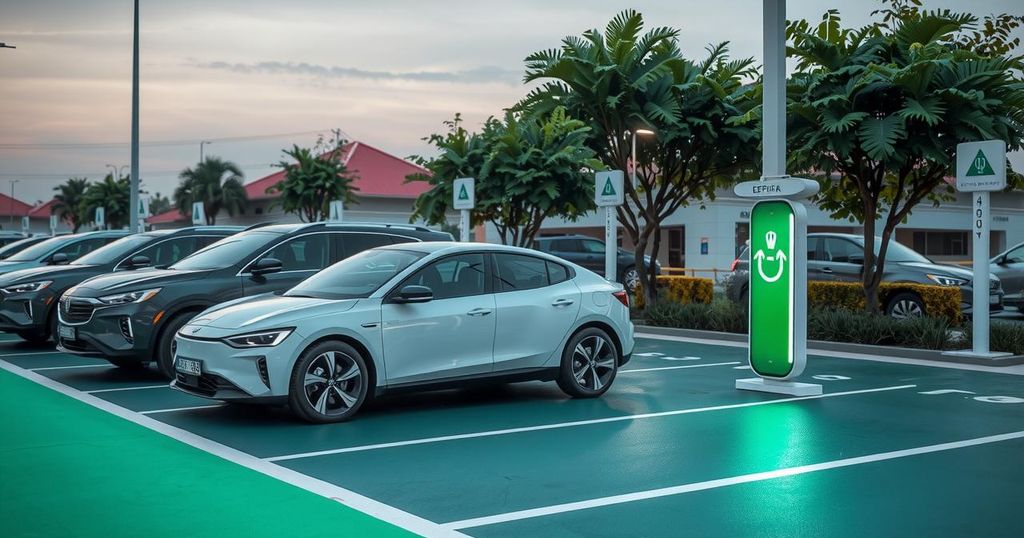Nigerian Expert Advocates for Electric Vehicle Adoption to Transform Transportation

Sunday Aluko, a Nigerian automotive expert, advocates for the adoption of electric vehicles in Nigeria to reduce dependence on imported fuel and improve transportation systems. He emphasizes the need for necessary reforms in various sectors, the establishment of charging infrastructure, and government incentives to encourage this transition. Aluko envisions Nigeria becoming a leader in sustainable transportation in Africa through collaborations and innovative solutions.
Sunday Aluko, a Nigerian automotive manufacturing expert based in the United States, has emphasized the critical importance of embracing electric vehicles (EVs) in Nigeria. He stated that the adoption of EVs could significantly decrease the nation’s dependence on imported fuel and transform its transportation infrastructure. Aluko underscored the necessity for urgent reforms in Nigeria’s energy, transportation, and vehicle manufacturing sectors to facilitate this transition towards eco-friendly electric vehicles.
In a recent conversation with a correspondent, Aluko highlighted alarming trends such as rising fuel inflation, persistent fuel shortages, and rampant fuel theft as key motivators for Nigeria to adopt electric vehicles. His research indicates that electric cars present a sustainable solution to the pressing energy and transportation issues facing the country. This transition is not only essential for environmental preservation but also presents the possibility of new economic ventures.
Aluko advocates for significant investment in the infrastructure required to support electric vehicles, including establishing accessible charging stations. He called on the Nigerian government to implement incentives like reducing import duties on electric vehicles and offering favorable tax conditions for manufacturers. “This situation underscores the importance of creating a favourable environment for electric vehicle adoption. Without the right policies and infrastructure, the transition will remain a distant goal,” he stated.
Furthermore, Aluko recommended that Nigeria should foster collaborations with international electric vehicle manufacturers to bolster local production capabilities. This strategy is projected to lower costs while simultaneously generating employment opportunities within the sector. He declared, “I am particularly focused on enabling Nigeria to lead in green mobility solutions in Africa. The shift to electric vehicles is not just an environmental necessity; it’s an economic opportunity.”
He further articulated the potential benefits of innovative concepts such as solar-powered charging stations and accessible financing options for consumers, positing that these strategies could serve as initial steps towards reducing Nigeria’s fuel dependency and enhancing its position as a leader in sustainable transportation across Africa.
Aluko firmly believes that with the appropriate policies, infrastructure investments, and public awareness campaigns, Nigeria can successfully transition to electric vehicles, thereby achieving a future characterized by economic growth, environmental sustainability, and energy independence. “With the right policies, infrastructure, and public awareness, Nigeria can transition to electric vehicles, creating a future of economic growth, environmental sustainability, and energy independence,” he stressed.
The discussion surrounding the adoption of electric vehicles in Nigeria is of increasing relevance as the country grapples with various challenges including fuel scarcity and inflation. Notably, electric vehicles offer a promising alternative by minimizing reliance on imported fuels and reducing environmental impacts. Experts, like Sunday Aluko, stress the necessity of reforms in several sectors, including energy and automotive manufacturing, to create a conducive environment for electric vehicle uptake. By situating this transition within broader economic opportunities, Nigeria could emerge as a regional leader in sustainable transportation.
In conclusion, Nigeria stands at a pivotal crossroads where the adoption of electric vehicles can address significant fuel dependency and environmental issues. As articulated by expert Sunday Aluko, implementing supportive policies and infrastructure is essential to facilitate this transition. By fostering local production capabilities and establishing partnerships with global manufacturers, Nigeria can potentially realize its position as a leader in sustainable transportation, unlocking economic growth and enhancing environmental sustainability.
Original Source: punchng.com





